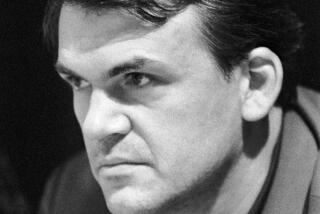So many Bartlebys
- Share via
Perfect. Beautiful. Wistful. There’s no hint of irony in these words of praise for “Bartleby & Co.,” the first novel by the Spanish writer Enrique Vila-Matas to appear in English. Only a reader devoid of feeling could resist a novel that begins: “I never had much luck with women. I have a pitiful hump, which I am resigned to. All my closest relatives are dead. I am a poor recluse working in a ghastly office. Apart from that, I am happy. Today most of all because, on this day, 8 July 1999, I have begun this diary that is also going to be a book of footnotes commenting on an invisible text, which I hope will prove my reliability as a tracker of Bartlebys.”
Yes, this is a reference to that Bartleby, the scrivener to whom Herman Melville gave the memorable reply, “I would prefer not to.” In this book Vila-Matas embarks on an exhilarating literary journey in pursuit of other Bartlebys.
Assiduously looking for writers who refuse to write or who have stopped writing, Vila-Matas sends his narrator through the lives and works of more than 150 authors around the world. In New York City, J.D. Salinger is spotted on a city bus moving down Fifth Avenue as our narrator sits opposite, hesitating to ask about Salinger’s famous silence or to address Salinger’s companion, who reminds him of a character in a Salinger story. When he overhears a few words Salinger speaks -- “Don’t worry. For Chrissake, don’t worry about it” -- the narrator realizes, “I was crossing a border, a kind of ambiguous, virtually invisible line where the ends of unpublished stories are hidden.”
Vila-Matas’ narrator tracks famous abandoners of literature -- Rimbaud, Tolstoy, Julian Gracq -- and obscure writers, like Bobi Bazlen, who believes it is no longer possible to write books: “Virtually all books are no more than footnotes inflated until they become volumes.” The most haunting story is of Clement Cadou, who spent his entire short life forgetting he had ever wanted to be a writer. As a young man, he developed an interest in the Polish writer Witold Gombrowicz, who visited him and his family. This visit permanently rescinded his ambition to be a writer: “I feel like a piece of furniture and pieces of furniture to the best of my knowledge don’t write.” This inspired Georges Perec’s study, “A Portrait of the Author Seen as a Piece of Furniture, Always.”
“Bartleby & Co” is an exquisite, exhilarating meditation on the “art of refusal” -- the perfect book for the beginning of the year or its end. This reviewer could go on, citing one wonderful incident after another, but (and Matas-Vila would likely approve) I prefer not to. *
More to Read
Sign up for our Book Club newsletter
Get the latest news, events and more from the Los Angeles Times Book Club, and help us get L.A. reading and talking.
You may occasionally receive promotional content from the Los Angeles Times.









